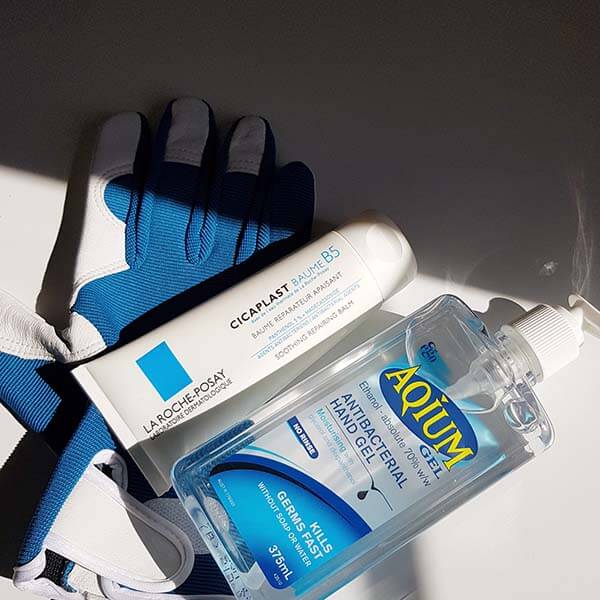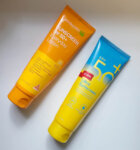I’ve talked about the ins and outs of DIY hand sanitisers quite a bit. So naturally people have started asking me:
How do you look after the skin on your hands when you’re washing and sanitising them so much?
How do you stop your hands from getting so dry and irritated?
So I asked a bunch of healthcare workers: dermatologists, doctors and nurses (including my mum) for their best tips on how to keep your skin happy while doing your part to prevent the spread of viruses. Here they are!
Check out the video on YouTube here, keep scrolling for the text version.
Why take care of your skin?
First off: why do we even care about keeping our skin in good condition? Shouldn’t we focus on just sanitising our hands as much as we can?
After my videos on hand sanitiser, there were a lot of people asking me why couldn’t they skip the glycerin in their hand sanitiser, and just use plain alcohol. Some people even asked if they could just use bleach if they were happy to just deal with the consequences on their skin.
But it’s important to remember that skin is the first line of defence you have against germs – not just coronavirus, but other germs as well. You don’t want your skin barrier to be compromised so microbes can get in more easily and give you an infection.
“Skin is the first barrier and line of defence, so you don’t want to have dry and cracked hands because that’s just going to let pathogens in.”
— Dr Prashant Chanda, Doctor and Director of Noble Nurse
Cracks and flakes in your skin are also good places for germs to hide, so you might not be cleansing your hands properly if your skin is damaged. And of course, cleansers and sanitisers are going to sting a lot more if your skin’s damaged. That means it’ll be harder to rub your hands thoroughly with soap or sanitiser for 20 seconds, many times a day, which is what we’re all meant to be doing.
“Damaged skin … can also harbour higher numbers of microorganisms than intact skin.”
— Hand Hygiene Australia“Cracks can be an entry point for bugs, and can prevent you from washing properly.”
— Dr Nilly, Anaesthetist
If you start getting severe dryness and cracks in your skin that don’t seem to be improving with the tips here, make sure you talk to your doctor or a dermatologist who can work out what’s going on and what to do to fix it. (But if you follow the tips I’m about to talk about, hopefully it doesn’t get to that point!)
Onto the tips…
Use gentle cleansing and sanitising products
The first tip for dealing with hand irritation is to avoid it in the first place: by using gentle cleansing and sanitising products. Almost everyone I talked to for this video mentioned this.
My mum’s been a nurse for 45 years, and this was the main piece of advice she gave. For a while she had really severe hand dermatitis, where her skin was constantly cracked, irritated and raw despite using tons of hand cream. But then the hospital changed their brand of hand wash, and after a couple of weeks she didn’t need any moisturiser at all.
Different people are sensitive to different ingredients, so it might be worth trying a few products to see which one suits you best. My friend (an anaesthetist) mentioned that her hospital actually supplies a few options for people to choose from.
Choose a gentle hand wash
A few things to look out for to improve your chances of finding a suitably gentle hand wash:
Avoid soap
You’ve probably heard a lot about washing your hands with soap and water, but “soap” here really just means any hand washing cleanser. True soaps are alkaline with a high pH, while skin is acidic and has a low pH. This means soap will disturb your skin’s pH and irritate it, especially if you’re doing this repeatedly every day.
Related post: All About Cleansing & How to Choose a Gentle Cleanser
Soap-free cleansers use synthetic detergents, and can be formulated at a lower, more skin-friendly pH. They still have nearly the same cleaning properties as soap – they’ll remove the virus from your hands and help it wash away, plus they can break down the lipid envelope of the coronavirus and inactivate it.
Less ingredients
In general, products with a shorter ingredients list will also give you a lower chance of irritation, since the chance of you being sensitive to any of the ingredients will be lower.
You might find that your regular hand wash is too irritating when you use it at current levels – save it for later and switch to something more friendly for sensitive skin for now.
Here are a few very gentle cleansers designed for sensitive skin that dermatologists have recommended:
Choose a gentle hand sanitiser
Use ethanol over isopropanol
Studies have found that isopropanol (isopropyl alcohol or rubbing alcohol) is more irritating than ethanol on your skin, so choose sanitisers with ethanol if you can.
Related post: How Bad Is Alcohol in Skincare, Really? The Science
Look for moisturising ingredients
Sanitisers that contain moisturising ingredients like glycerin have also been found to reduce dryness and irritation.
Try different sanitisers
Different hand sanitisers will have different ingredients – other than the type of alcohol, there’s also fragrances and other preservatives and thickeners. These can make a big difference to hand irritation, so you may need to try a few hand sanitisers before finding one that keeps your hands happy.
Again, choosing a hand sanitiser with a shorter ingredients list will reduce the chances of you reacting to a particular ingredient in it.
Wash hands less, use more sanitiser
A bit of an unexpected tip is that using a properly formulated fragrance-free sanitiser with moisturising ingredients in it will generally be less damaging than hand washing.
“Alcohol-based handrub produces the lowest incidence of irritant contact dermatitis of all the hand hygiene products currently available.”
— Hand Hygiene Australia“Alcohol based hand sanitisers are better for the skin than frequent hand washing.”
— Australasian College of Dermatologists
Of course this depends on the formulas of the hand sanitisers and cleansers you’re using, but generally sanitisers will damage your skin less, since exposure to too much water is actually irritating to your skin.

Gentle Hand Washing
Onto a few tips for how to wash your hands to minimise dryness and irritation:
Pat hands dry, don’t rub
After washing, pat your hands thoroughly dry with a towel rather than rubbing to reduce irritation. This also gets rid of water faster – again, water is irritating, and if it’s in contact with your hands for too long your skin can start breaking down.
Don’t use hot water
Hot water strips your skin of its natural moisturising substances much faster than lukewarm or cold water.
Wear protective gloves
Wear waterproof gloves for washing dishes and preparing food
It’s also a good idea to avoid getting your hands wet outside of washing. Water is an irritant, and keeping your hands wet for long periods can make your skin barrier break down faster.
“Use gloves for any tasks where your hands become wet or you need to wash your hands frequently.”
— Australasian College of Dermatologists
Washing dishes is particularly hard on your hands. As well as water exposure, there’s dishwashing detergent. It’s designed to wash greasy dishes, not dirty hands, so it’s harsher than hand soap. You also use it far longer than the 20 seconds you need for hand washing.
Waterproof gloves are also a good idea for preparing food. Some foods are also irritating for your skin, plus gloves mean you won’t have to wash your hands as much.
Make sure you change the gloves when they get wet or sweaty inside, since having your hands soaking in water will break down skin. It’s also a good idea to avoid using latex gloves if you can – latex allergy is common.
“For those wearing gloves around, be mindful to change them often and don’t use gloved hands to touch your face. It doesn’t replace good ol’ diligent hand washing”
— Dr Aegean Chan, Dermatologist
Wear breathable gloves for housework
When you’re doing housework or gardening, you can wear fabric gloves to cut down how much you need to wash your hands.
Wear gloves in cold weather
If you’re in a place where it’s cold and dry, it’s a good idea to protect your hands when you’re outside with winter gloves. Cold air and exposure to wind can make skin dryness and hand eczema worse.
Use a good hand cream
There are a lot of good hand creams out there – if you haven’t found a good one yet, the dermatologists I talked to all recommended fragrance-free hand creams. Allergies and irritation are especially likely to happen if your skin is already irritated and sensitive from all the hand washing, so avoiding fragrance and really any sort of additional ingredients is a good precaution.
“Fragrances can potentially worsen dermatitis so as a rule of thumb, if it smells good, unfortunately you probably want to stay away from it for active hand eczema.”
— Dr Anjali Mahto, Dermatologist
Some ingredients to look out for in a hand cream:
- Glycerin and ceramides can help repair your skin barrier.
- Niacinamide (vitamin B3) can also reduce sensitivity
- Hyaluronic acid is a good humectant for attracting water back into your skin.
“Niacinamide (Vit B3) has antioxidant properties that help with redness, and soothes irritated skin.”
— Dr Adeline, Resident Dermatologist
Specific hand cream recommendations:
- Neutrogena Norwegian Formula
- Vaseline Hand Cream
- Aquaphor Healing Ointment
- Cerave Hand Cream
- Cetaphil Cream
- Vanicream Cream
- La Roche-Posay Cicaplast Baume B5
- La Roche-Posay Lipikar Balm
- Bioderma Atoderm Hand Cream
3M Cavilon Barrier Cream is a heavy duty barrier cream that uses dimethicone to protect skin, and lasts through several washes.
Several dermatologists also suggested using petrolatum-based products at night – you can also use these during the day, but they can be a bit greasy and sticky. It’s best not to use these before using latex gloves since petrolatum can weaken latex.
Using hand creams effectively
Some tips on using hand creams:
Use hand creams frequently
Use hand cream every time you wash your hands, not just at night. To help remind yourself to use them, you can keep separate tubes of hand cream in different places (bedside table, desk, TV, car).
You can also pair hand creams up with small bottles of hand sanitiser – leave a set in the car, a set in your hand bag and a set in your pocket so you don’t accidentally leave the house without them.
Apply hand cream all over hands
Remember to apply all over your hands, including in between your fingers.
Apply moisturiser and then gloves overnight
For a deeply moisturising treatment, at night you can put on your hand cream then cover your hands with cotton gloves. The gloves stop the cream from coming off on your sheets, so your hands can soak in the cream more effectively. If you don’t have cotton gloves, you can use socks.
Dr Papri also recommends to soak your hands in tepid water for 10 minutes in a clean tupperware container, then pat dry and apply hand cream when your hands are wet before you put the gloves or socks on to intensely moisturise your hands
Caring for Damaged Skin
If your skin does get damaged, here are some tips for looking after it.
Seal Cracks Up
A few dermatologists I spoke to recommended trying superglue or liquid bandaid for sealing cracks and fissures in your skin, to protect it and make it less painful while it heals.
Don’t pick at skin
Try not to pick at dead skin or blisters – it can make your skin vulnerable to infections and make the itching worse.
“Resist the temptation to pick at dead skin or try to “pop” the deep blisters … This only exacerbates the itching and can open your skin to infections.”
— Dr Joyce, Dermatologist
Do you have any hand care tips to share?
This post contains affiliate links – if you decide to click through and purchase any product, you’ll be supporting Lab Muffin financially (at no extra cost to you), thank you! For more information, see Disclosure Policy.






I always enjoy reading your posts. And I learn something new every time.
Thanks for the informative post, Michelle!
When my hands get really bad, I like to wash them with a petroleum based cleanser, like the “orange soap” mechanics use to keep their hands soft. There is one that’s getting difficult to find by C.O. Bigelow called chapped hands cleanser. I swear this will clear up the worst case of chapped (and calloused!) hands in a few days if you can get over the feeling of it not really coming off when you rinse. I don’t know about it’s disinfectant qualities, though, so maybe LabMuffin can comment? Or use it after you wash with another cleanser? Here’s the link https://www.bigelowchemists.com/c-o-bigelow-chapped-hands-soap-free-cleanser-140-6-5-oz-184-g.html
It’s a bit hard to tell from the ingredients list – does it foam up when you use it?
Until we were all told to “wash with soap and water,” most of the cleansers in my home were soap-free. I tried for the first weeks of quarantine to find out if these were acceptable for the current situation and NO ONE knew. Not even the COVID hotline. I found this article on a chemistry website. Syndets are not recommended. So are you saying syndets are better than increasing irritation? Are you saying they are enough in general?
https://chemistscorner.com/cosmeticsciencetalk/discussion/7233/soap-is-better-for-corona-virus
Syndets should work the same as soap to break down the lipid envelope of the coronavirus in this situation. Cleansers also work by washing germs away – this is actually how they deal with most germs (coronavirus just happens to be particularly fragile to surfactants).
I have a tube of hand cream pretty much everywhere – at the office. in my bag, next to the sink. Otherwise my skin would be in a bad state right now.
My main tip would be to apply Hand cream before you put on the gloves to wash the dishes – like a hand mask, but without the down time!
That’s a clever hack!
Thanks for the info – very important in these times. Interesting to learn that you might be doing more harm than good by washing / sanitizing hands too often. Sounds like finding a good balance and the right products is the way to go 🙂
Thanks for this amazing article 🙂 I have a question regarding barrier creams. After I got cracks between my fingers I went to the pharmacy and they gave me Excipial P – a barrier cream. It works at protecting the skin like a miracle, but a side effect is that soap doesn’t lather much if I have it on… Does it compromise the effect from washing my hands?
Also, my boyfriend works with money and was much worse in terms of cracks and an eczema-like flare-up when all this started, but the skin recently began recovering after he started applying oils at night. Now he has brownish spots where the flare-up was. Is this pigmentation something to worry about, or it will just fade away on its own?
It could potentially decrease the effectiveness of soap if it isn’t foaming as much – does it do this with just one type of soap, or several?
The brown spots do sound like post-inflammatory hyperpigmentation – he could try some of the products here: https://labmuffin.com/video-routine-fading-acne-marks-post-inflammatory-hyperpigmentation/
It could potentially be something else though, so it’s best to get it checked out by a doctor if you suspect it might not be PIH.
It’s with all soaps at home 🙁 I better leave that out for the time being, then. As for the spots – I believe it’s exactly that type of hyperpigmentation, so thanks for the recommendations! Always helpful ?
It’s so important! Thanks for all the work you’re putting in!
Thank you very much!
Thank you for your timely message. Especially, for bringing attention to the importance of protecting the skin on our hands. Last month, my hands were rough and flaking from frequent handwashing at work. As you mentioned applying hand sanitizer on the damaged skin caused stinging and irritation. I used shea butter but saw little improvement. Then I applied a skincare essence on them and the shea butter after, and my skin eventually healed. Just curious, is there scientific evidence to support the benefits of this approach?
Oh wow this is a new one for me and I think it sounds really cool! Thanks for sharing blog about handcare.
Hello Michelle. I really liked your article. Every body are concerned about their skin and I really like the products that you recommended in this article. Among them neutrogena is my favorite one. I have been using the cleanser, sunscreen and a moisturizer from neutrogena for a year and my pimples have vanished completely and I no longer have dry skin. Keep posting more tips. Have a nice day!